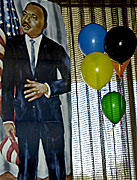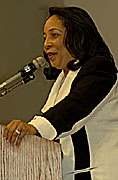Well, last night I had a dream. It was your typical repetitive nightmare. To set the scene, bombs from sleek jets were filling the sky like locusts. The attacks were incessant. Huddled under cover (literally a quilt) with a few motley souls, with my heart racing I wondered how we would survive being blown to smithereens. A larger plane flew by. Garishly labeled in red, white and blue along its side were the words, American Air Lines. "It's one of ours," someone yelled. The plane was gone in an instant. Upon retrospection, its appearance could only be judged as ludicrous.
I'm not sure what this dream has to do with events yesterday held at Missouri Southern State University honoring the memory of Dr. King. But anyone who had been involved in the Civil Rights Movement of the 60s would relate to the fear that was omnipresent at that time. Civil Rights marchers put their lives on the line to bring about social change. They faced tear gas that burned, dogs that attacked, night sticks that drew blood and water canons that struck the flesh like bullets, and, of course, they faced real bullets that killed. And in the beginning the law was on the side of their adversaries.


Sheyann Webb-Christburg, best known as Dr. King's Smallest Freedom Fighter," was the keynote speaker at Missouri Southern's MLK Symposium Program. The petite but feisty woman, currently coordinator of student activities at Alabama State University, recalled the time that led to Bloody Sunday, the first attempted march by freedom fighters across the Edmund Pettus Bridge in Selma, Alabama. It was March 7, 1965 and Webb-Christburg was only 8 years old. Organized by the Rev. Dr. King and the Southern Christian Leadership Conference as a protest against the murder of civil rights leader Jimmie Lee Jackson by an Alabama state trooper in late February, Webb Christburg passionately described how the march led to chaos and spilled blood.
"What I saw and experienced as a child would strike a cord at any age," Webb Christburg told the audience. Calling attention to Missouri Southern's motto, "big enough to be interesting, small enough to feel you belong," Webb-Christburg said as a child she was just the right size as well when Dr. King allowed her--and her contemporary Rachel West Nelson--to listen to his speeches at the Brown Chapel African Methodist Episcopal (AME) Church in Selma and consequently to take part in the protest movement.
A product of Selma's George Washington Carver Projects and one of eight siblings, Webb-Christburg said she learned at an early age to believe in herself and a higher self. With confidence instilled by Dr. King and others, she learned early on who she was and that she "wanted to do positive things."
"Far too many instances have been forgotten," she said, referring to the time when blacks were forced to sit in the back of the bus, had no voting rights and suffered verbal and physical abuse. "Yes, but they are a vague memory. The problems of today are so complicated."
She spoke of people whose names should not be forgotten: Viola Liuzza, the white housewife from Detroit who was killed because she chauffeured black activists, Margaret Moore, a teacher who eventually lost her job but whose hand she can still feel holding, Amelia Boynton Robinson and John Lewis who refused to turn around on the bridge. Josiah Williams, Rev. James Reeves, Jonathan Daniels--the names are burned in her mind and on her heart as well as the picture of Bloody Sunday.
In reflecting how far her race has come, how much blood, sweat and tears were shed to gain the right to vote, for instance, Webb-Christburg warned everyone that "the struggle was not over." She stressed that all people must "work together as brothers and sisters."
"If you believe it, you will achieve it," she said. She concluded that "God uses ordinary people to do great things."
To view these pictures, click on each thumbnail for a larger version.
|
|
|
|
|
|
|
|
|












Comments